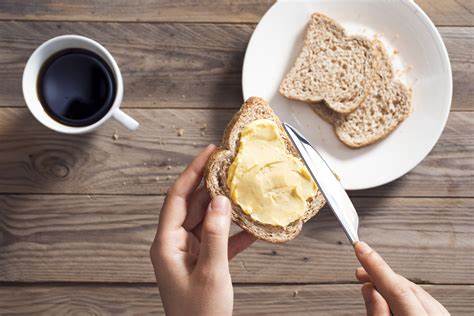If you’ve ever found yourself in the dairy aisle at your local grocery store, confused by the myriad of options between butter and substitutes, you’re not alone. This article will guide you through the maze and help you make an informed decision.
Understanding Butter
Derived from the fat of cow’s milk, butter is a natural food product appreciated for its rich flavor and creamy texture. However, it’s high in saturated fats, which can increase LDL (the “bad” cholesterol), potentially leading to heart disease when consumed excessively.
Enter Butter Substitutes
In contrast, butter substitutes emerged in the market as a heart-healthy alternative to traditional butter. Derived from plant oils, these products generally have less saturated fat, more unsaturated fats, and contain zero cholesterol. But not all substitutes are created equal.
Navigating Butter Substitutes
Here’s where things get complicated. When it comes to choosing between margarine and butter, the real answer is that neither is a good choice. With numerous brands, each offering a different formulation, choosing the right butter substitute can be challenging. Some are made with healthier oils like olive or avocado, while others might contain less healthy oils like palm or coconut. So, let’s dive into what you need to look for on those nutrition labels. What keeps butter and butter substitutes solid at room temperature is saturated fats in butter and trans-fat in margarine. Therein lies the problem.
Watch Out for Saturated and Trans Fats
In margarine, it’s trans-fat that’s created when hydrogen is used to harden vegetable oil. More often, for tub margarine, plant-based solid fats are used such as palm or palm kernel oils while stick margarine may have trans-fat. Tub margarine is the better choice.
Equally important is to avoid trans fats, which can raise your LDL cholesterol and lower your HDL (the “good” cholesterol). While many substitutes have phased out trans fats, make sure to verify the ingredient list for “partially hydrogenated oils”. The downside of partially hydrogenated oils is that they contain trans fats, which have been linked to increased levels of low-density lipoprotein (LDL), or “bad” cholesterol, and decreased levels of high-density lipoprotein (HDL), or “good” cholesterol. This imbalance can increase the risk of heart disease.
Checking the type and quantity of fats is vital. Saturated fats should ideally be less than 13 grams per day, based on a 2,000-calorie diet, as per American Heart Association guidelines.
Mind the Sodium
The sodium content in butter substitutes can vary, so be sure to check. A healthy limit for most adults is 1,500 mg per day, with an upper limit of 2,300 mg.
Unsalted Butter
Unsalted butter, also known as sweet butter, is simply butter that has no salt added during the process of production. It’s made from cream or milk, which is churned until it turns into butter.
Unsalted butter is often preferred in baking because it allows the baker to control the amount of salt in the recipe. It’s also used in certain cooking applications where the fresh, creamy taste of the butter is desired without any additional saltiness.
However, unsalted butter does have a shorter shelf life than salted butter because salt acts as a preservative. It’s typically best to use unsalted butter within a few weeks of purchasing it, and it should be stored in the refrigerator.
In terms of nutrition, unsalted butter is still high in saturated fats, like regular butter, and should be consumed in moderation as part of a balanced diet. The main difference is the sodium content. If you’re trying to reduce your sodium intake, choosing unsalted butter can be one way to do so.
The Short List
The list below are butter substitutes that have been praised for their taste and quality. Please remember to check the ingredients and nutrition facts for each product, as these can vary.
- Earth Balance: Earth Balance produces a range of vegan butter substitutes. Their spreads are plant-based, non-GMO, and free from trans fats.
- I Can’t Believe It’s Not Butter!: This brand offers a variety of spreads, some of which are made with a blend of oils such as soybean, palm, and olive. They also have light and olive oil-based varieties.
- Miyoko’s Creamery: Miyoko’s makes a vegan butter substitute from organic coconut oil and cashew cream. Their products are non-GMO and free of palm oil.
- Smart Balance: Smart Balance spreads are made without hydrogenated or partially hydrogenated oils and are free from artificial preservatives.
- Brummel & Brown: Their spreads are made with real yogurt and plant-based oils, providing a creamy texture and a dose of good fats.
Lastly, don’t forget to check the calories per serving. Since butter and its substitutes are calorie-dense, those numbers can add up quickly if you’re not careful.
The Final Verdict
So, which is the healthier choice? It depends on your individual health goals and dietary needs. As a general rule, choose a substitute made from a healthier oil like olive or avocado, has low saturated and trans fats, and fits into your calorie goals. Also note that palm oil is the least healthy. When in doubt, consult your healthcare provider or a nutritionist for personalized advice.


